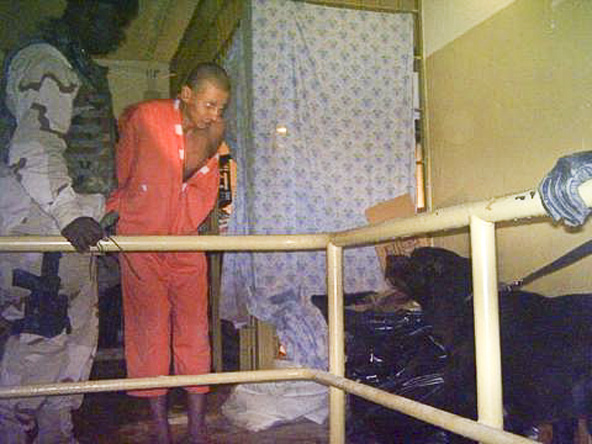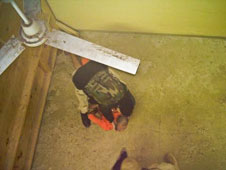
2004, Abu Ghraib prison, Iraq. This photograph shows a prisoner being menaced with a dog held by a soldier to the right of the frame.
Photo: courtesy, Charles Graner
7 May 2004, Baghdad, Iraq.
Al Baz said that much of his mistreatment took place in a building at the Baghdad airport, a place where he heard the sounds of prisoners screaming for long periods of time. If his account is accurate, it means that the abuse of prisoners in Iraq is not limited to Abu Ghraib prison or a single military unit. It may well be, as military critics argue, systematic.
Like many other prisoners of Abu Ghraib, al Baz was never charged with a crime and did not have the opportunity to defend himself before any court. As soon as he was arrested, he found himself plunged into a secretive network of American detention facilities with little connection to the outside world, a zone where human and civil rights were completely ignored. As a civilian in occupied Iraq, he should have been protected by the Geneva Convention, but instead, al Baz became the victim of a war crime perpetrated by US soldiers. Article 147 of the Fourth Geneva Convention defines war crimes as: "Willful killing, torture or inhuman treatmentUnlawful confinement of a protected personwillfully depriving protected person of the rights of fair and regular trial."Al Baz, who is a single man of medium build and a slight belly, hardly presents the image of a insurgent. There is nothing threatening about him. He is not dramatic, choosing instead to make his points in a straightforward way. Al Baz never raised his voice while he was talking, and he did not seem angry about his incarceration over three days of meetings. In a country of furious people, al Baz did not make a political speech. He was uncomfortable with all the attention.
Al Baz, was not an ordinary Iraqi as far as the soldiers were concerned; he works for al Jazeera, the Arab network with few fans in the administration. Defense Secretary Donald Rumsfeld recently excoriated al Jazeera's coverage of Falluja, saying, "I can definitively say that what al Jazeera is doing is vicious, inaccurate and inexcusable." These comments reflect the bitter feelings the administration has toward producers of negative news about the occupation. But this bitterness is not confined to words - the US military attacked al Jazeera buildings in both Baghdad and Kabul. As Baghdad fell to American forces on the 8th of April last year, a bomb struck the office of the network and killed Tariq Ayoub, an al Jazeera cameraman. Many journalists who have covered the war for the past year believe there is a clear pattern of intimidation toward the network by the coalition. The Bush administration has countered by accusing the channel of producing broadcasts that are biased against the United States.
Al Baz believes he was singled out because of his employer. "They knew me, they had stopped me before," al Baz said about the soldiers from the Fourth Infantry Division. His account raises the straightforward question of whether senior officials in the US military conspired to intimidate a network they openly hated. Al Jazeera, finding itself walking on increasingly thin ice in Iraq had a crisis on its hands with an arrested cameraman. "We believe that Suhaib was not treated in accordance with his status as a journalist in a war zone. He was released from Abu Ghraib from a period of confinement without being charged," said Jihad Ballout, a spokesman for the network in Qatar.
Al Baz also was able to describe his abusers, and in several cases provide names for the most brutal. These names matched the independent accounts of other prisoners who had also spent time in the prison. It also appears that some of the military personnel involved in the torture used aliases to conceal their identities from the Iraqis. A man some of the former Abu Ghraib prisoners called "Joiner" was identified in one of the published photographs as Specialist Charles A. Graner in the New York Times. Al Baz also mentioned a man called "Joiner" when talking about the worst abuses he saw at Abu Ghraib.
The cameraman's ordeal began Nov. 13 last year, when al Baz arrived at the site of a convoy attack in Samarra with his camera. US soldiers stopped him and began to search his car. Al Baz said that when they found his Al Jazeera ID badge, the soldiers asked him how he knew about the attack in advance, and then tied his hands behind his back. Al Baz says he arrived at the site four hours after the attack, and by that time, the entire city knew about it. Following his arrest, al Baz says that soldiers from the 4th Infantry Division took him to a US military base in Samarra and interrogated him for two days.
"At the base I first saw a tall heavy man who put a black hood over my head," he recalls. "Then he forced me to stand in front of a wall for three or four hours. I was treated very roughly, then taken to a room and interrogated. When the tall man was not satisfied with my answers, he hit me in the face. They asked questions in a way that showed they were not interested in the truth." Al Baz says at first he was not given food, water or allowed to pray. On the second day, he was given foul-smelling food. Immediately after his arrest, colleagues from the network and friends began to pressure the coalition for information but were told by General Kimmit's staff that there was no information available. This is a common reply for people seeking information about recently detained people. Al Baz said it took a week for the military to issue him a prison ID number
I believe that the torture of prisoners was far more widespread than we knew and was ordered at the highest levels of the government. It was policy plain and simple. Most of the American soldiers I spoke to about it were ashamed and thought it repugnant.
 LEAD IMAGE: 2004, Abu Ghraib prison, Iraq. A soldier kneels on a prisoner during interrogation.
LEAD IMAGE: 2004, Abu Ghraib prison, Iraq. A soldier kneels on a prisoner during interrogation.Photo: Charles Graner
© Phillip Robertson, 2009-2014.
